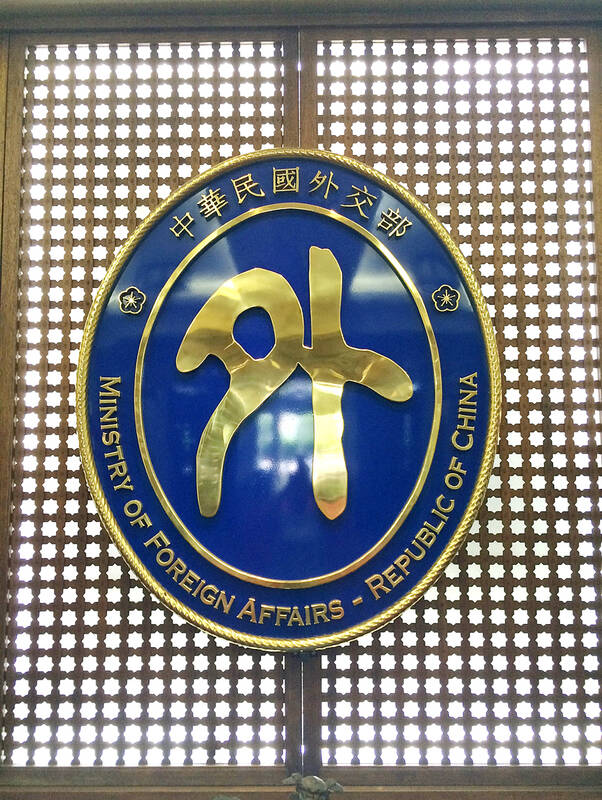Taiwan has no immediate plan to recognize a Palestinian state, but the government is closely monitoring the latest developments on the issue, the Ministry of Foreign Affairs (MOFA) said yesterday, calling on the Palestinian authorities to engage in exchanges with Taiwan.
The ministry’s comments came after the UK, Australia, Canada and Portugal announced formal recognition of the state of Palestine, with France expected to follow.
Palestine and China established formal diplomatic ties in 1988, and in 2023 signed a joint statement to establish a Chinese-Palestinian strategic partnership, in which Palestine said Taiwan is an “inalienable part of China’s territory.”

Photo: Taipei Times
Palestine “resolutely opposes any form of ‘Taiwan independence’ and reaffirms that it will not conduct any form of official exchanges with Taiwan,” it said.
The ministry said that Taiwan was included in the Permanent Observer Mission of the State of Palestine to the UN’s map of countries that recognize a Palestinian State, as it sees Taiwan as part of the People’s Republic of China.
This was “disrespectful to Taiwanese sovereignty,” the ministry said, calling on all parties “to show self-restraint... and resolve differences through ongoing communication.”
Taiwan has helped in humanitarian relief efforts in the Gaza Strip, such as donating US$500,000 to the humanitarian non-governmental organization Mercy Corps in May last year to provide aid through the group’s Palestine branch, it said.
However, the nation has also pledged to donate funds to a medical project in an Israeli settlement, the ministry said, adding that it would not cross any red lines, despite criticism from human rights groups domestically and abroad.
Currently, 147 of the 193 UN member states recognize the state of Palestine, which has been a non-member observer state of the UN General Assembly since November 2012.
The Israeli and US governments have said that recognition of a Palestinian state would be a “diplomatic gift for Hamas.”
More than 65,000 Palestinians have been killed in Israel’s war on Gaza, local health authorities said, while an independent UN inquiry concluded this month that Israel’s actions amount to genocide.

The first global hotel Keys Selection by the Michelin Guide includes four hotels in Taiwan, Michelin announced yesterday. All four received the “Michelin One Key,” indicating guests are to experience a “very special stay” at any of the locations as the establishments are “a true gem with personality. Service always goes the extra mile, and the hotel provides much more than others in its price range.” Of the four hotels, three are located in Taipei and one in Taichung. In Taipei, the One Key accolades were awarded to the Capella Taipei, Kimpton Da An Taipei and Mandarin Oriental Taipei. Capella Taipei was described by

EVA Airways today confirmed the death of a flight attendant on Saturday upon their return to Taiwan and said an internal investigation has been launched, as criticism mounted over a social media post accusing the airline of failing to offer sufficient employee protections. According to the post, the flight attendant complained of feeling sick on board a flight, but was unable to take sick leave or access medical care. The crew member allegedly did not receive assistance from the chief purser, who failed to heed their requests for medical attention or call an ambulance once the flight landed, the post said. As sick

Minister of Economic Affairs Kung Ming-hsin (龔明鑫) yesterday said that private-sector refiners are willing to stop buying Russian naphtha should the EU ask them to, after a group of non-governmental organizations, including the Centre for Research on Energy and Clean Air (CREA), criticized the nation’s continued business with the country. While Taiwan joined the US and its Western allies in putting broad sanctions on Russia after it invaded Ukraine in 2022, it did not explicitly ban imports of naphtha, a major hard-currency earner for Russia. While state-owned firms stopped importing Russian oil in 2023, there is no restriction on private companies to

INDUSTRY: Beijing’s latest export measures go beyond targeting the US and would likely affect any country that uses Chinese rare earths or related tech, an academic said Taiwanese industries could face significant disruption from China’s newly tightened export controls on rare earth elements, as much of Taiwan’s supply indirectly depends on Chinese materials processed in Japan, a local expert said yesterday. Kristy Hsu (徐遵慈), director of the Taiwan ASEAN Studies Center at the Chung-Hua Institution for Economic Research, said that China’s latest export measures go far beyond targeting the US and would likely affect any country that uses Chinese rare earths or related technologies. With Japan and Southeast Asian countries among those expected to be hit, Taiwan could feel the impact through its reliance on Japanese-made semi-finished products and